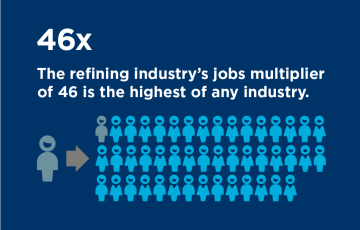Economic prospects for all industries—including refineries—look bleak. What context is missing from these stories?
Susan Grissom, AFPM Chief Industry Analyst: If we focus on the near term—say, the next couple of months—there will of course be some challenges. We’re operating in an unprecedented situation to be sure, but the short-term situation does not alter some basic truths:
- Fuel is essential to the global economy and America’s economic well-being. That will not change.
- U.S. refiners will remain an essential part of the U.S. energy supply for the foreseeable future. It’s not just about how tomorrow or next month looks; these refineries are here for the long haul and they supply not only the United States but the rest of the world.
- The U.S. refining industry is the most competitive and resilient in the world. The refining sector has proven itself to be very resilient operationally but also as well-run businesses. Some of these refineries have been around for 100 years. Their diversified business and product lines and efficiency in many respects leaves them better prepared to weather this storm.
What are some of the factors that make the U.S. refining industry resilient, even amid the challenges of COVID-19 and in a global market where Russia and Saudi Arabia are overproducing and tanking the cost of crude?
SG: One of the strengths of the U.S. refining industry as a whole is that it is not monolithic — it includes a number of different business models, sizes, and specialties.
Many U.S. refiners are diversified businesses that don’t depend solely on the sale of liquid transportation fuels for profitability, which insulates them from demand shocks like that which is resulting from efforts to address COVID-19. Others are independent and merchant refiners that have no part in upstream energy extraction or the retail sales of finished gasoline, which insulates them from things like the Russia-Saudi oversupply challenge.
A number of companies have the capability to process different kinds of crude oil and turn them into a variety of fuels, or are diversified into the petrochemical, biofuel, midstream and retail areas. These diversifications create opportunities to adjust various aspects of their business model to adapt to changing market conditions. For instance, if gasoline demand weakens, they may be able to adjust and produce more diesel, where demand looks to remain strong.
Companies have a number of mechanisms to help them survive, but perhaps the most important factor is that this current challenge will eventually pass. Liquid transportation fuels will continue to be indispensable to the U.S. and global economies and that will not change anytime soon. There are certainly short-term challenges to overcome — and the duration of the COVID-19 economic downturn, among a number of other factors, will affect how daunting these are — but the fact remains that the U.S. refining industry, and the fuels they produce, are and will remain an essential part of modern life.
The refining industry has long been designated as a “critical industry,” which the administration recently reaffirmed. What does that mean for refineries?
SG: Firstly, it’s important to remember that crude oil has no value until it runs through a refinery. Refineries therefore function as the backbone of U.S. energy — and even in these unprecedented times, emergency first responders, essential services, and even trips to the grocery store depend upon fuels produced by U.S. refiners. It’s not overly dramatic to call them a critical industry, and they have held this status for years with the Department of Homeland Security and the Department of Energy.
Practically, their long standing as critical infrastructure and national security assets means that refineries are prepared for a range of disruptive events, including natural disasters and medical emergencies. This has fostered a strong culture of safety within the industry, with extensive planning, preparing, and practicing for emergencies being part of standard business.
While the COVID-19 pandemic is still a highly fluid and unpredictable situation, refiners’ experience as a critical industry has left the industry better prepared to effectively respond and adapt.
Should consumers be worried about a lack of gasoline?
SG: The short answer is that there’s no foreseeable shortage from the refining segment.
It’s important to understand, though, what’s included in the refining segment. The refining industry does not have control over either the upstream sector — the actual extraction of oil and natural gas — or most retail gasoline sales.
There are no indications refineries will struggle to get crude oil right now, especially in an oversupplied market. And we have every expectation that our facilities will continue essential operations with measures in place to keep our workforce healthy. We do not foresee there being a mass idling of U.S. refineries and a dearth of refined product resulting in fuel shortages.
If remote regional facilities cut capacity or idle due to workforce shortages, there could potentially be delays in supplying fuel to specific geographies, but those can be quickly addressed. The U.S. fuel supply chain is resilient and adaptable, well able to adjust when there’s a disruption in a particular region. The midstream energy transportation industry is notoriously clever and scrappy, and has a long history of coming up with — or building — ingenious logistical solutions to move fuel and refined product to regions experiencing disruptions with their local suppliers. For instance, after Hurricane Harvey, Magellan reversed its pipeline in order to deliver gasoline, diesel fuel and jet fuel to the Dallas and West Texas areas.
As noted above, refiners don’t tend to control actual retail sales. Many gas stations, even stations branded to correspond to an “oil major,” are independent businesses or franchisees. The “big name on the gas station sign” has no influence over whether individual stations will remain open to consumers or operate with restricted hours.
There may be short-term impacts to consumers at some point, but we do not live in a moment right now where we need to worry about a shortage of gasoline.
Washington is in the process of passing a series of supplemental appropriations bills aimed at cushioning the economic blow of COVID-19. Are the refining and petrochemical manufacturing industries seeking help?
SG: The U.S. refining industry will weather this storm, but what the industry needs most from government is for them to “do no harm” at this time. Refiners take very seriously their charge to supply America’s energy needs, and they need continued access to crude and capital to continue to deliver on this critical function.
Refiners aren’t seeking bailout relief from the government or financial stimulus, but they do need to avoid having additional hurdles thrown their way. This includes avoiding unnecessary burdens such as increased regulatory costs, operational costs, or uncertainty; keeping the energy market free and open by avoiding embargoes or tariffs that would drive up consumer costs; and where appropriate, streamlining access to capital and loans.
America doesn’t have a government-sponsored oil cartel. We’re competitive, which is our strength. And since energy is essential to every U.S. industry and consumer, the market needs to remain competitive.


